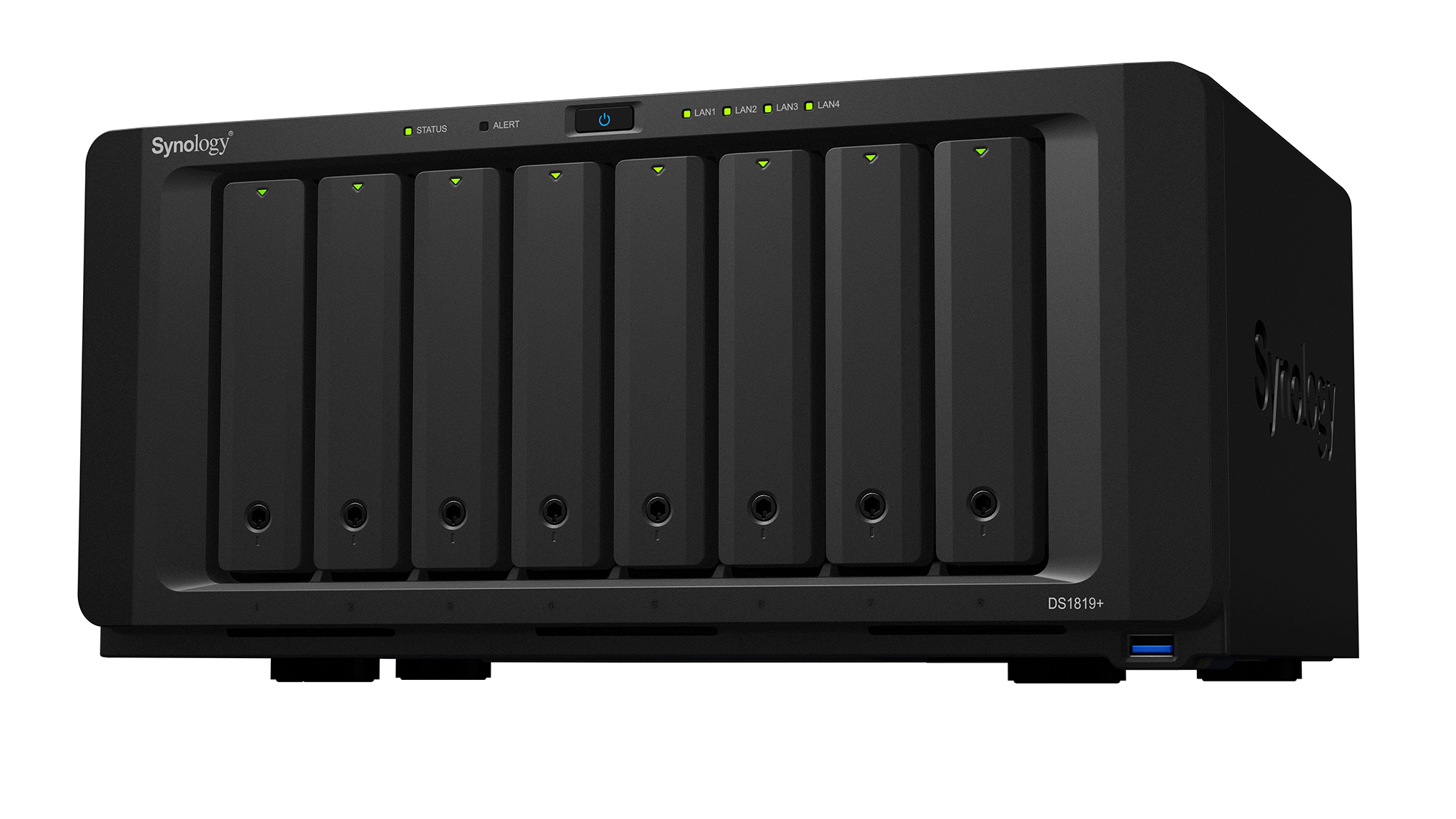Synology DiskStation DS1819+ review: A classic, reborn
A fast and affordable desktop NAS that’s the perfect choice for business backup duties


There’s no doubt the CPU and memory upgrades have given Synology’s 8-bay desktop appliance a new lease of life. It’s fast over 10GbE, offers a high storage capacity and Synology’s classy Active Backup Suite collection of apps make it a prime candidate for small business backup.
-
+
Outstanding data protection features; Speedy 10GbE performance; High maximum capacity
-
-
Nothing in particular

Synology's DS1819+ delivers the hardware upgrade this popular 8-bay NAS appliance has been crying out for. Out goes the flawed Atom C2538 CPU from its predecessor, the DS1817+, and in comes a more powerful quad-core 2.1GHz Atom C3538 and support for faster DDR4 memory.
Memory starts at 4GB and can be easily upgraded to 32GB as the two SO-DIMM slots are located behind a removable hatch in the base. Port permutations haven't changed; you still get a quartet of Gigabit Ethernet ports plus three USB 3 ports at the rear and one at the front, while the dual eSATA ports team up with Synology's DX517 5-bay expansion units to push the drive count to 18.
10-Gigabit (10GbE) upgrades are on the cards too - the appliance's PCI-E slot accepts a range of industry-standard 10GbE network adapters. Alternatively, you can install Synology's M2D18 dual-slot M.2 SATA/NVMe SSD card to provide a high-performance cache.
Deployment is a cinch, and Synology's discovery web portal found the appliance on our network and downloaded the latest DSM 6.2 software. We installed four 12TB Seagate IronWolf drives in the tool-free carriers and used the Storage Manager app to create a single SHR (Synology Hybrid RAID) storage pool although traditionalists can choose standard RAID5 or 6 arrays.
Data protection is an area DSM excels at. Its Snapshot Replication app supports on-demand and scheduled snapshots of Btrfs volumes with NAS folders and iSCSI LUNs and can replicate them to remote Synology appliances. The Hyper Backup app handles all manner of local, remote and Rysnc backups while the Cloud Sync app can secure appliance data to a wide choice of cloud providers.
However, the star of Synology's protection detail is the new Active Backup for Business (ABB) app, which delivers full backup, restore and disaster recovery services for Windows servers and workstations plus VMware vCentre and ESXi hypervisors. Windows systems require agents loaded which can be downloaded directly from the ABB app while VMware VM application-consistent backups just need a secure connection to vSphere.
We had no problems logging ABB in to our VMware ESXi host where it listed all VMs for backup source selection. With agents loaded on our Windows 2016 servers and Windows 10 desktops, we could also create scheduled protection tasks and choose from bare-metal, system volume or selective backups.
ABB performs deduplication and during our backup tests, we saw it report impressive reduction ratios of up to 6:1. Even better, ABB works with VMware hosts or DSM's Virtual Machine Manager (VMM) app and can create instant VMs from selected backups for disaster recovery purposes.
The DS1819+ is significantly faster than the DS1817+, too. With a share mapped over 10GbE to a Dell EMC T640 Xeon Scalable tower running Windows Server 2016, we watched Iometer report raw read and write NAS speeds of 9.2Gbits/sec and 4.8Gbits/sec.
The DS1819+ fared equally well in our real world tests. Our 25GB test file was read from the share at 5Gbits/sec and written to it at 3.9Gbits/sec. Backup performance was another winner and our 22.4GB folder and its 10,500 small files was secured at an average of 2.4Gbits/sec.
Tests run on a DS1817+ returned 4.4Gbits/sec and 3.2Gbits/sec for the single file copy test and a slower 1.5Gbits/sec for the backup test. The DS1819+ also handled encrypted shares better with our 25GB file written down at 1.6Gbits/sec -- 0.5Gbits/sec faster than the DS1817+.
The DS1819+ is a great choice for presenting IP SANs with a 500GB target returning Iometer read and write speeds of 9.2Gbits/sec and 6.3Gbits/sec. Running the same test on a DS1817+ saw read and write speeds tumble to only 3.5Gbits/sec and 1.6Gbits/sec.
There's no doubt the CPU and memory upgrades have given Synology's 8-bay desktop appliance a new lease of life. It's fast over 10GbE, offers a high storage capacity and Synology's classy Active Backup Suite collection of apps make it a prime candidate for small business backup.
Get the ITPro daily newsletter
Sign up today and you will receive a free copy of our Future Focus 2025 report - the leading guidance on AI, cybersecurity and other IT challenges as per 700+ senior executives
Dave is an IT consultant and freelance journalist specialising in hands-on reviews of computer networking products covering all market sectors from small businesses to enterprises. Founder of Binary Testing Ltd – the UK’s premier independent network testing laboratory - Dave has over 45 years of experience in the IT industry.
Dave has produced many thousands of in-depth business networking product reviews from his lab which have been reproduced globally. Writing for ITPro and its sister title, PC Pro, he covers all areas of business IT infrastructure, including servers, storage, network security, data protection, cloud, infrastructure and services.
-
 CISA issues warning in wake of Oracle cloud credentials leak
CISA issues warning in wake of Oracle cloud credentials leakNews The security agency has published guidance for enterprises at risk
By Ross Kelly Published
-
 Reports: White House mulling DeepSeek ban amid investigation
Reports: White House mulling DeepSeek ban amid investigationNews Nvidia is caught up in US-China AI battle, but Huang still visits DeepSeek in Beijing
By Nicole Kobie Published
-
 Google faces 'first of its kind' class action for search ads overcharging in UK
Google faces 'first of its kind' class action for search ads overcharging in UKNews Google faces a "first of its kind" £5 billion lawsuit in the UK over accusations it has a monopoly in digital advertising that allows it to overcharge customers.
By Nicole Kobie Published